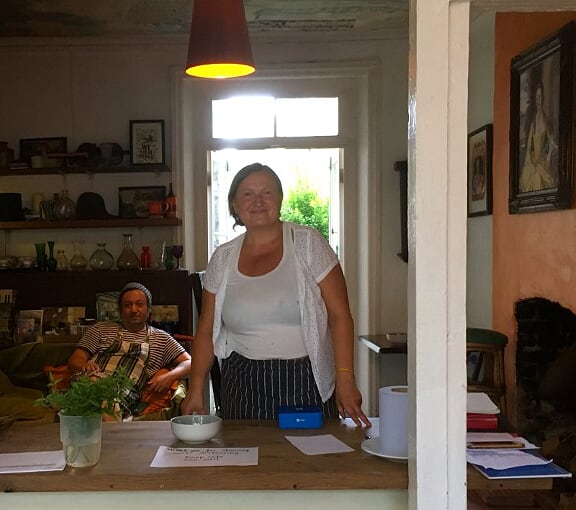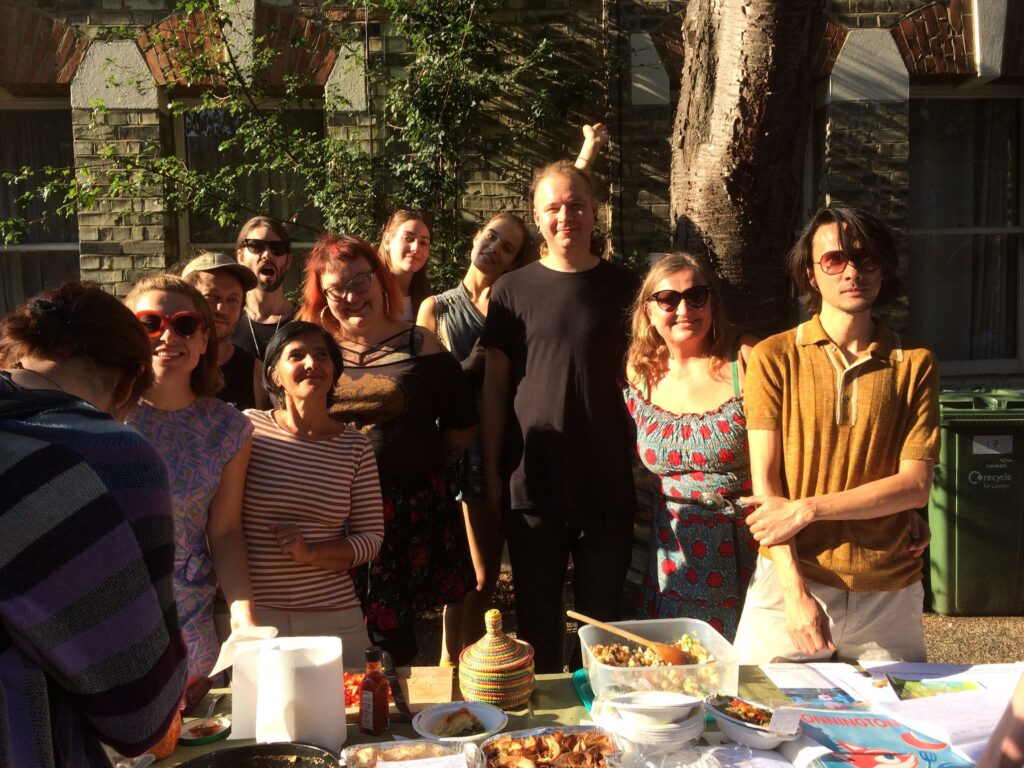In these times more than ever, I feel strongly about the value of social enterprises in London and the need to shine a light on their activities. I’ve written before about Sarah Bentley and her work with Made In Hackney, and have also mentioned the Luminary Bakery, which offers opportunities to women at a social or economic disadvantage. This week, the work that The Bonnington Café is doing to provide free meals to people in need came onto my radar.
I have been a big fan of The Bonnington Café for many years now. In the pre-Covid days, my ‘Bonnington Girls’ and I used to make a regular Thursday evening appointment for vegan night, armed with a bottle of wine (each) and ready to set the world to rights. Not only is the food delicious (and an absolute steal at £3.50 for a starter, £9 for a main and £3.50 for a pudding), the atmosphere is cosy and intimate, the perfect haunt for those dreamy nights of full stomachs and gossip with friends, which seem like relics of a distant past now.
I always knew that this was a collectively run café, but I wasn’t totally clear on what this meant on a practical level, nor was I aware of the social altruism surrounding the café and the amazing work that they do within the community. I reached out to the team at The Bonnington to find out more and chef, Ela Ciecierska, very kindly gave me the following interview.

Can you tell us a bit about the origins of the Bonnington Café?
The Bonnington Square and Vauxhall Grove area in Vauxhall was quite derelict and dilapidated in the eighties. There were many empty houses with boarded up windows and doors. At the same time there was shortage of affordable housing in London. Squatting was legal and it was practiced widely by students, artists and others. It was a non-materialistic way of living, quite minimal. You couldn’t have opulent home decorations or fixtures as you could be taken to court, served with eviction notice and have to leave suddenly. The social, political and economic landscape in London was very different to now. Squatting was a resourceful and sustainable way of living.
The café was established where it is today because it was the only house in the square with a cooker. Someone installed a big professional stove there and people took turns to cook. Everybody from surrounding houses would come and eat there together. It was free and communal.
The nearby New Covent Garden Market provided the source of cheap or free vegetables. If you went in early enough there were masses of fresh vegetables and fruit which could be taken from the skips. Some market traders would be friendly and offer you extra surplus foods, others did not like it at all.
The Bonnington Café now
Much has changed in the years since the café originally opened, but not the sense of community. No single person runs the restaurant, rather it’s maintained by an active collective of member cooks who also contribute to the overall running of the venue and who are still committed to providing excellent vegetarian home-cooking in a laid back and friendly, bohemian atmosphere.
The Café’s regulars have been coming back for years, they love dinner by candlelight, a burning fire on a winter night, and the sense that they are part of a community. Our cooks are from all over the world, so the menu will be different on any given night. From Japanese to Medieval inspired; and from new Italian and French to new American, each cook brings their own style and background to the Café’s veggie fare.
Has it always been a vegetarian café?
The café has always been vegetarian. There was a movement for healthy eating and alternative diets. Places like Brixton Wholefoods, Neil’s Yard and Food for Thought in Covent Garden, Macrobiotic East West Centre in Old Street were thriving.
How does the collective work on a practical day-to-day level?
Every day is a different chef so the menu and the ambiance vary accordingly. We all agree to use only non-genetically modified foods, we compost, we recycle. The prices are consistent and affordable and the menu always has a vegan option.
Decisions are taken collectively and the chef has freedom to cook in their cultural and personal style. We do not have a manager but we have assigned roles and responsibilities: maintenance, health and safety, educational and development etc.

The core membership is supported by a waiting list group. Anyone interested in cooking at the café can join our waiting list and after some training run a day at the café.
Collective decision making can be a tedious process, but the diversity of voices and opinions translate into responsibilities that are shared which makes things easier. When we start a new initiative, for example a herb garden in the neighbourhood community gardens for our educational workshops, there are people available to suddenly transport 2 tonnes of organic soil into the planter from the street nearby where the lorry could not drive in.
Most of our community activities, workshops, benefits suppers and free training could only take place because we are a collective.
How have you had to adapt during the course of the past year? Have you faced periods of closure, or did you move straight to a take away model?
When lockdown was announced the cafe was closed for 5 months and then reopened as a take away mid- August.
With a smaller team and reduced days and hours of opening. We have reopened twice with limited table service and as soon as it picked up it went down immediately with the subsequent lockdown restrictions. The take away is slow. We are continuing because we all want to keep the café going and we believe our complimentary meals help quite a few people.
Tell us a bit more about the community meals. Are these a new initiative or do these have their roots in the original Bonnington ideal
Meals on the house have always been a part of the café as well as benefit events for various causes, free workshops and community projects for low-income participants. But not with the consistency and numbers we see today.
When we reopened as a take away during lockdown we asked City Harvest if they could support us with their surplus produce in order to provide additional free meals in the lockdown. I do not think we would be able to open at all without this help.
We knew some of our customers who had encountered difficulties due to the pandemic and we directly invited them to come and get their takeaways daily. We also asked for referrals in the local community and via charities like Home Start Lambeth. This was useful as a word of mouth would not always reach everyone who needed it.
This initiative remains very close to the origins of the café itself. We are a providing free meals to anyone who comes and asks. No referral is needed. No questions asked.
How long have you been cooking at the Bonnington Café and what drew you to the café in the first place?
I was a customer in the eighties but then did not return till late nineties when I was an art student in nearby Goldsmith. After graduating I soon realised that the art world may not really be my cup of tea and started to help Rachel at the café and loved being there. She suggested to get my own night at the café. So I did.
Despite getting a job teaching photography a year later I continued with my occasional cooking. I learned heaps: how to be confident, how to work hard, how to work collectively. I am into organic foods, fermentation and healthy eating. The Bonnington Café offered the opportunity to make home cooked food while considering sustainability.
What is the most popular dish that you like to cook at the Bonnington?
I love making bean stews! Simple flavours, fresh herbs and spices, foods cooked from scratch and not too many ingredients. Good quality oil is a must; olive oil is my favourite. Letting the food cook itself is important: not too much stirring and poking. Let it cook slowly – from scratch till delicious. I use seasonal and local ingredients where possible: Brixton Farmers market is great for this.
Having lived in Brixton most of my London life, the Caribbean culture has influenced my cooking hugely. I love Jamaican flavours: scotch bonnet chilli pepper and thyme are my favourite seasonings. Closely followed by pumpkin, yam, okra and sweet potato. And more thyme. In all its varieties. My partner, who comes from Guyana, brought me a broad leaf thyme plant from home. It now fills the windows of the café and we all use it in our stews.
How can readers support what you are doing?
We are doing a crowdfunder campaign now. Please support us if you can and share it as widely as you can. Any donation, no matter how small is helpful.

Also I would like to warmly invite everyone to our ZOOM screening of Joe Walsh documentary about the café: What’s the Beef about Bonnington? The screening is one of our crowd funder events. Any donation you put into the crowd funder will reserve you a place for the film 26th of January at 7pm.
And how can they enjoy a delicious Bonnington meal?
At the moment we are open for take-aways Wednesday, Thursday, Friday and Saturday, 1pm to 7 pm. We are 100% vegan this January! Just come and get your take away.
You can contact the cook of the day to pre- order if you wish. Their details are on our website: www.bonningtoncafe.co.uk
We are also on Facebook and Instagram. Keep checking our social media for updates on our workshops on Fermentation: Beetroot, Kimchi and Kombucha. Also Growing Culinary Herbs, Sugar and Wheat Free Desserts and more. These will hopefully recommence when lockdown restrictions are lifted.
Can you share one of your favourite recipes?
I will share my Black Eye Peas stew. It is a simple recipe – good for winter. It uses all my favourite ingredients. Serve on its own or with quinoa or rice. (Keep an eye out for this recipe, which we will be sharing here soon).
For more information relating to this article
Please email bonningtoncafeusergroup@gmail.com or contact Ela Ciecierska directly on 07806629166 or dramaqueenproduction@hotmail.com
What a lovely article – thank you! I love the interview with Ela, and the photos. I used to work with Ela and love the ethos of the place.